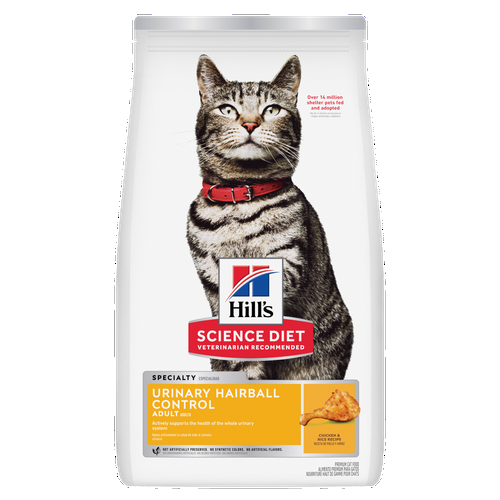
-
Find the right food for your petTake this quiz to see which food may be the best for your furry friend.Find the right food for your petTake this quiz to see which food may be the best for your furry friend.Featured products
 Adult 7+ Small & Mini Chicken & Brown Rice Recipe Dog Food
Adult 7+ Small & Mini Chicken & Brown Rice Recipe Dog FoodFor the unique nutritional needs of mature Small & Mini dogs
Shop Now Adult Small & Mini Lamb Meal & Brown Rice Recipe Dog Food
Adult Small & Mini Lamb Meal & Brown Rice Recipe Dog FoodFor the faster metabolism of Small & Mini dogs
Shop Now Hill's Science Diet Adult Oral Care Chicken, Brown Rice & Barley Recipe Dog Food
Hill's Science Diet Adult Oral Care Chicken, Brown Rice & Barley Recipe Dog FoodClinically proven kibble technology to reduce plaque & tartar build-up
Shop NowFeatured products Hill's Science Diet Adult Sensitive Stomach & Skin Dog Food
Hill's Science Diet Adult Sensitive Stomach & Skin Dog FoodHighly digestible recipe, gentle on stomachs. Nourishes skin & promotes a lustrous coat
Shop Now Adult Urinary Hairball Control Chicken & Rice Recipe Cat Food
Adult Urinary Hairball Control Chicken & Rice Recipe Cat FoodActively supports the health of the whole urinary system
Shop Now Adult Indoor Chicken Recipe Cat Food
Adult Indoor Chicken Recipe Cat FoodSupports energy level and beautiful fur in indoor cats
Shop Now -
Featured articles
 Easy DIY Dog & Cat Toys: Nine of Our Favorites
Easy DIY Dog & Cat Toys: Nine of Our FavoritesBrowse this comprehensive guide for several of our favorite DIY dog and cat toys that are sure to put a little pep in your pet's step.
Read More 15 Pet-Friendly Cities Ideal for a US Road Trip
15 Pet-Friendly Cities Ideal for a US Road TripCheck out our list of pet-friendly U.S. cities that are excellent travel options, offering off-leash dog parks and pet-friendly restaurants & hotels.
Read More My Pet Ate a Lizard — What Should I Do?
My Pet Ate a Lizard — What Should I Do?Learn what to do if your pet eats a lizard, including whether they can be toxic and symptoms to keep an eye on when they've swallowed one.
Read More -


Can dogs be vegan? There's a lot of controversy surrounding this question. While some people may claim that their dogs thrive on a meat-free diet, many experts express concern that a vegan meal plan for dogs lacks the nutritional requirements for a truly healthy dog. So, which side is correct?
Can Dogs Be Vegan?

The short answer is that yes, technically speaking, dogs can survive and even do well on a vegan or vegetarian regimen, says Cummings Veterinary Medical Center at Tufts University. While it's commonly believed that dogs are carnivores like their wolf ancestors, meaning that they must eat meat to survive, this is incorrect. Although they're members of the order Carnivora — which, it should be noted, also includes the giant panda, a species that eats almost exclusively bamboo plants — dogs are actually omnivores. Canine digestive systems are quite capable of digesting and deriving nutrients from fruits and vegetables.
Because of this, and the fact that some dogs are allergic to animal proteins, sometimes veterinarians and licensed pet nutritionists will prescribe specially designed meat-free diets to treat dogs with allergies and other types of health problems. With that said, Tufts University cautions that a dog food plan devoid of animal fats and proteins is potentially dangerous and should never be fed without the supervision of a professional.
Why a Vegan Regimen Is Dangerous for Dogs
Designing a meat-free food for dogs that contains all of the necessary nutrients for them to thrive is extremely difficult, even for licensed veterinary nutritionists, says Tufts. While the canine digestive system can get nutrition from plant matter, it has a much easier time processing animal matter. Fruits and vegetables are great for providing vitamins and antioxidants that can help your dog thrive, but they lack the necessary amounts of fat and protein. Proteins derived from animal products, like collagen, elastin and keratin — all of which are vital for healthy skin, muscles and joints — are difficult, if not impossible, to derive from a vegan diet. The bottom line is that, unless it's done very carefully under the guidance and supervision of a licensed veterinary nutritionist, making your dog vegan could lead to severe health complications and malnutrition.


Tasty Tips
How to Feed Your Dog If You're Vegan
So, what's a vegan pet parent to do? If your motivations for leading a vegan lifestyle are purely health-related, then it's important to realize that the health benefits that you derive from eating vegan don't extend to your dog. But things can get stickier if you're a vegan for ethical reasons. If you're struggling to strike a balance between feeding your dog a healthy diet and remaining true to your principles, here are some things that might help:
- Talk to your vet about your concerns. They may be able to direct you to some quality dog foods that use eggs or dairy in place of meat, while also addressing any questions and concerns you have about what you should feed your pooch.
- Consider compromising by feeding your pup a fish-based dog food.
- Shop around for high-quality dog foods that use humanely sourced meats as well as ethically sourced fruits and vegetables.
- If you're absolutely determined that your dog eat vegan, consult a licensed veterinary nutritionist to develop a nutritionally sound vegan diet for your dog.
While the short answer to "Can dogs be vegan?" may technically be yes, as you've seen, the more thorough answer is that it's far from ideal and even dangerous in some cases. Although it's admirable to be concerned about the welfare of all animals, when it comes to feeding your four-legged best friend, it's his life and health that should be at the forefront of your concern.


Jean Marie Bauhaus is a pet parent, pet blogger, and novelist from Tulsa, Oklahoma, where she usually writes under the supervision of a lapful of fur babies.
Related products

Clinically proven kibble technology to reduce plaque & tartar build-up

Improves everyday ability to get up & go

For the faster metabolism of Small & Mini dogs

For the unique nutritional needs of mature Small & Mini dogs
Related articles

Discover how the field of dog science is giving us more and more insights into the inner workings of our furry best friends.

Understand the role that Omega-6 and Omega-3 fatty acids play in your dog's overall health, and how you can ensure they are getting enough.

Your dog's coat and skin are a big part of your dog's overall health. Ensure you keep your dog's coat healthy, by following these simple tips.

Learn basic steps & precautions for treating a cut on your dog, including what you can put on the cut, and when you should take them to the vet.

Put your dog on a diet without them knowing
Our low calorie formula helps you control your dog's weight. It's packed with high-quality protein for building lean muscles, and made with purposeful ingredients for a flavorful, nutritious meal. Clinically proven antioxidants, Vitamin C+E, help promote a healthy immune system.
Put your dog on a diet without them knowing
Our low calorie formula helps you control your dog's weight. It's packed with high-quality protein for building lean muscles, and made with purposeful ingredients for a flavorful, nutritious meal. Clinically proven antioxidants, Vitamin C+E, help promote a healthy immune system.

